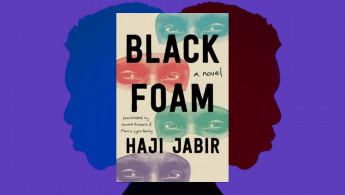Black Foam elevates the complexities of migration, racism and Ethiopian Jewry
Belonging and identity are concepts that many people from the so-called ‘Global South’ discuss in juxtaposition to Western identity and placement. But what happens when that’s turned on its head, and context are regions in Africa, such as the Horn, and the Middle East?
This query sits at the heart of the novel, Black Foam, written by award-winning Eritrean author, Haji Jabir.
The Al-Jazeera journalist poignantly tells a story that focuses on the experiences of refugees and racism that will resonate with many readers long after the last page is turned.
Longlisted for the 2019 International Prize for Arabic Fiction, one of the most prestigious prizes for fiction in Arabic, Black Foam was published for the first time in English on February 7.
"There is a beautiful specificity and universality in Dawoud’s experience that makes it difficult not to connect with him, and that is also true for his friends and well-wishers"
Set during the final years of Eritrea’s long-drawn War of Independence against Ethiopia, Black Foam centres Dawoud, a former Eritrean military assistant who takes the risky and dangerous journey from his home country to Ethiopia and then finally to Israel, to run away from a murky past.
This comes with a web of truths and half-lies, that a host of colourful characters sometimes help him conjure up to trick UNHCR, camp officials and Israeli border officials.
But something as elemental as his name is what really has the power to hold him back or bring him towards his destiny. What he wants or ‘needs’ to be called is the penultimate metaphor marking each stage in the book.
Depending on where he is, Dawoud is the human chameleon that is also David, Adal, or Dawit. But he is not lost between these identities, they are instead the making of him.
It reminds me of how Black identities have historically been contorted and misconstrued for the purpose of assimilation in the host country. That this dynamic occurs in the book, and in the Horn of Africa and the Middle East, demonstrates the complex and multifaceted nature of the region as far as political, religious and cultural identities go.
|
But this is as much a story about erasure and cultural appropriation as it is about belonging. A key component of the plot is Dawoud’s co-option of the Beta Israel identity, also known as Falasha Jewry.
They are a group of Ethiopian Jews who have for decades, migrated from East Africa to seek a permanent home in Israel, which they say is their original homeland.
In an interview with Arab Lit, Jabir explains the novel’s characters reflect his aim to ‘shed light on Eritrea and the Horn of Africa, on its people, history, and culture.’ He goes on to say that “the story of the Falasha Jews preoccupied me for a long time, but I refrained from starting on it until I had made the necessary preparations to write the work.’ The care he elicits for their sensitive history and sensibilities is apparent.
By 1991, over 40,000 members of Beta Israel were repatriated to Israel. As Teshome G. Wagaw mentions in The International Political Ramifications of Falasha Emigration, their ‘unofficial’ status as a religious minority in Africa, continued to be a problem in Israel, because of the hesitation of some Israelis to recognise them as ‘authentic Jews’.
One line in the book best exemplifies their wilderness, “The stunned mass of Black humanity seemed to come from some distant era.” It is in the midst of this that Dawoud, who himself is fixated on solidifying his own sense of identity experiences heightened forms of xenophobia and racism, compared to what he faces in Ethiopia when he acts as himself.
|
The chapters of the book slip between the past and the present to represent what could be interpreted as the pace of Dawoud’s thoughts and tact. At first, I found this method of storytelling a little bit confusing, however, I came to appreciate how it provokes some suspense, perhaps mimicking the interplay between empowerment and uncertainty that any migrant would go through.
In short, the buck could stop at any time for him, and that kept me on edge with each passing chapter. A sense of chronology was not needed. No more than a profound understanding of the courage of real-life refugees and migrants and what they go through in some of the most impossible circumstances. Of course, there are those who take advantage, but as Black Foam, the reality is not always what it appears to be.
The twists and turns that came with Dawoud’s tact at every interval would keep the reader invested, in discovering with him, whether he will find the life he wants, and whether what he thinks he has left behind, in fact, remains with him.
There is a beautiful specificity and universality in Dawoud’s experience that makes it difficult not to connect with him, and that is also true for his friends and well-wishers. At a time when the political and social discourse around migration and xenophobia is sometimes futile and toxic, Black Foam is a poignant reminder of the simplicity of human endeavour and tenacity.
Adama Juldeh Munu is an award-winning journalist that's worked with TRT World, Al-Jazeera, the Huffington Post, Middle East Eye and Black Ballad. She writes about race, Black heritage and issues connecting Islam and the African diaspora.
Follow her on Twitter: @adamajmunu


![President Pezeshkian has denounced Israel's attacks on Lebanon [Getty]](/sites/default/files/styles/image_684x385/public/2173482924.jpeg?h=a5f2f23a&itok=q3evVtko)



 Follow the Middle East's top stories in English at The New Arab on Google News
Follow the Middle East's top stories in English at The New Arab on Google News


